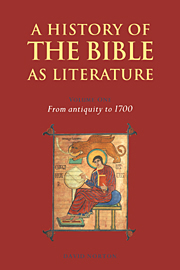Book contents
- Frontmatter
- Contents
- List of plates
- Preface
- List of abbreviations
- 1 ‘This treasure in earthen vessels’
- 2 The early Christians and biblical eloquence
- 3 Jerome
- 4 Augustine and his successors
- 5 The occult text
- 6 The challenge to the translators
- 7 Slaves of the Vulgate
- 8 Creators of English
- 9 From the Great Bible to the Rheims-Douai Bible
- 10 The King James Bible
- 11 Presentations of the text, 1525–1625
- 12 Sixteenth-century movements towards literary praise and appreciation of the Bible
- 13 The struggle for acceptance
- 14 ‘The eloquentest books in the world’
- 15 Versifying the Psalms
- 16 ‘The best materials in the world for poesy’
- Appendix
- Bibliography
- General index
- Biblical index
- Plate section
12 - Sixteenth-century movements towards literary praise and appreciation of the Bible
Published online by Cambridge University Press: 05 June 2012
- Frontmatter
- Contents
- List of plates
- Preface
- List of abbreviations
- 1 ‘This treasure in earthen vessels’
- 2 The early Christians and biblical eloquence
- 3 Jerome
- 4 Augustine and his successors
- 5 The occult text
- 6 The challenge to the translators
- 7 Slaves of the Vulgate
- 8 Creators of English
- 9 From the Great Bible to the Rheims-Douai Bible
- 10 The King James Bible
- 11 Presentations of the text, 1525–1625
- 12 Sixteenth-century movements towards literary praise and appreciation of the Bible
- 13 The struggle for acceptance
- 14 ‘The eloquentest books in the world’
- 15 Versifying the Psalms
- 16 ‘The best materials in the world for poesy’
- Appendix
- Bibliography
- General index
- Biblical index
- Plate section
Summary
Verse translations
Literary ideas of the Bible were germinating in sixteenth-century England. Alongside the main line of translations, there were alternative versions, especially versifications of poetic parts of the Bible. These versifications often lead to conclusions similar to those reached from the main translations, but they also helped to create a consciousness of these parts of the Bible as poetry. In doing so, they probably reinforced a sense of poetry by presenting the poetic books in verse form. Moreover, some of the commentators on these books helped by reminding their readers of patristic opinions not only on their subject-matter, but also on their poetic nature.
These versions were an essential part of the Protestant effort to open the Bible to the people. Not only were the Psalms believed to be central expressions of biblical truth, but there was also a long tradition of their popular use, and, being relatively brief, they could more easily be published in a form suited to the private individual than a whole Bible or even the NT. Almost all the Psalters and books of biblical poetry were published in cheap formats that were easy and convenient for any literate individual to own. This is of course an absolute contrast with the official Bibles, and even a contrast with the popular Geneva Bibles. The first edition of Thomas Sternhold's Psalms (1548) is a neat, slim volume measuring 12.8 by 10.2 cm, and many of these books were of about this convenient size or smaller.
- Type
- Chapter
- Information
- A History of the Bible as Literature , pp. 177 - 209Publisher: Cambridge University PressPrint publication year: 1993



